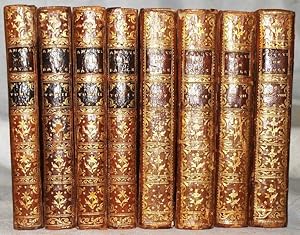pierre bayle francois marie marsy robinet (1 resultados)
Tipo de artículo
- Todo tipo de artículos
- Libros (1)
- Revistas y publicaciones
- Cómics
- Partituras
- Arte, grabados y pósters
- Fotografías
- Mapas
-
Manuscritos y
coleccionismo de papel
Condición
- Todo
- Nuevos
- Antiguos o usados
Encuadernación
- Todo
- Tapa dura
- Tapa blanda
Más atributos
- Primera edición
- Firmado
- Sobrecubierta
- Con imágenes del vendedor
- Sin impresión bajo demanda
Ubicación del vendedor
Valoración de los vendedores
-
Analyse raisonnee de Bayle, ou abrege methodique de ses ouvrages, particulierement de son Dictionnaire historique et critique: dont les remarques ont ete fondues dans le texte, pour former un corps instructif & agreable de lectures suivies (8 volume set)
Publicado por Londre[s] [but Paris]: [publisher not identified], 1755
Librería: Sequitur Books, Boonsboro, MD, Estados Unidos de America
Miembro de asociación: IOBA
Libro Original o primera edición
Hardcover. Condición: Good. First Edition. 8 volume set. Volume I-IV, 1755; Volume V-VIII; 1773. Bound in full armorial calf. Gold seal of Louis Marie August, 4th Duke d'Aumont stamped to the front and back covers. Gilt spine. Solid bindings, with chipping to spine. Joints cracking to a few volumes. All edges gilt. Marbled end pages. Scattered and sparse foxing, internally good. Worming hole to bottom margin of Vol. VI. Early signature of Chevalier D'Espagnac on title pages. An important book in the history of freedom of thought. Analyse de Bayle was a controversial work, censored in France during its time. Marsy, a former Jesuit, compiled Bayle's writings that were unfavorable to religion. "Pierre Bayle made a case for the possibility of a society of atheists in the late seventeenth century. Not surprisingly, Bayle's work became increasingly popular in France after 1750, aided by Marsy's popular summary of his ideas in Analyse raisonnee de Bayle, which was predictably condemned by the Paris Parlement in 1756. By the time Rousseau entered the fray of this debate Bayle's reasoning, 'which ran wholly counter to all arguments on behalf of a social religion, [had] entered the mainstream of enlightened speculation and caused some debate.' (Graeme Garrard. Rousseau's Counter-Enlightenment: A Republican Critique of the Philosophes" SUNY, 2003. p. 70). Much of the edition was burned, and the author was sent to the Bastille. The remaining four volumes (slightly different in style of binding because of the elapsed time) were compiled by Jean-Baptiste-Rene Robinet and did not appear until 1770 in Holland. (J.P. Belin, Le Mouvement philosophique de 1748 a 1789. 1913, pp. 71-73) Also, John Mackinnon Robertson. "A Short History of Freethought Ancient and Modern, Volume 2," Putnam, 1906. p. 225. Pierre Bayle was a Huguenot scholar who fled from French religious intolerance to Geneva and Holland. Bayle's influential encyclopedia was a best-selling philosophical work of the 18th century. The Dictionnaire's influence can be seen on Diderot, Locke, Leibniz, Kant, Hume, Berkeley, among others. Although an avowed Christian by faith rather than by reason, Bayle's fideist approach to the question of God created the logical framework for an atheist worldview. Bayle pointed out contradictions between theological tenets and the supposedly self-evident dictates of reason, though at the same time sought to promote religious tolerance, and argued strongly against inflexible and authoritarian application of religious articles of faith. (Standford Encyclopedia of Philosophy remarks that Bayle's most significant impact is on the impulse towards modern atheism.).


